#Its hard to describe without the actually context
Text
Just saw an annoying take about a character I like 10 dead 15 traumatized
#Like it was almost fine but there was just a minor detail about it that felt almost insulting? To another character#And i was like NO#Its hard to describe without the actually context#(which i will not say for obvious reasons)#But it was like a hc about the character a's world's people tearing down character b for something#That was done in a very complicated situation that they have nothing to do with#And indirectly (because of the context) shitting on other beloved characters#In a way that i think rounds back to character a in a negative way#AAND ARG i know this makes no sense without context#But it wouldve been absolutely assholeish of me to reblog or comment my thoughts#To someone who had a relatively harmless fun hc that made them and some other people whonsaw it happy#However i disliked it just enough to want to vaguely rant about it in my own post#In a way that if the op im annoyed at ever saw it they wouldnt feel hurt#because thats not the point of fandoms and community#Just because i thought their hc sucked ass and ultimately undermined and babied the blorbo they were intending to praise#Doesnt mean i need to take away the joy and fandom enrichment they got from making such a take#There are exceptions to this like a genuinely harmful take#but thats neither here nor there
0 notes
Text
one day ill do a vibe analysis of From a place of love (of ruinamili fame) and then youll see. then youll All see.
#its hard to describe the way it presents itself. the cadence of it; imean.#bc its creepiness stems mainly from context and genre disruption rather than its actual presentation#but its presentation being so genuine in its meaning Doubles Down on the horror without it being. horror itself. yknow.#piktalk#projmoon#imight elaborate when iget out of bed. i just like vibe assigning tracks :] mayb ill do it for fun.
9 notes
·
View notes
Text
Nerdy cultural details about the Hashira
Some details can be hard to pick up without context or in translation. Here's a handful for fun:
Breath names:
The "Mushi" (蟲) of "Mushibashira" (蟲柱) does not necessarily mean "insect." It's also not the more commonly used "mushi" kanji (虫). Kanji is often formed with many components compounding together to make new meanings, and 蟲 is a crowd of three 虫. While it might be tempting to simply say that this is a whole bunch of 虫, I've also heard this described as 蟲 being the more abstract idea of the concrete 虫, or that 蟲 went through a resurgence in popularity shortly before the Taisho Period. 虫 is preferred nowadays for its simplicity.
In either case, it's not necessarily "insects." Rather than being limited to six-legged creatures, "mushi" is a catch-all term for many kinds of creepy-crawlies that simply do not fit in other categories of animals, so spiders and centipedes and worms are all part of it. Actually, the term was originally used for snakes!
Next, what are picturing when you hear "Stone Hashira"? Something in your hands that you can throw? A big stone to lay on for warmth after training in a waterfall?
You could think even bigger than that, because the "stone" kanji used is "iwa" 岩. This is usually something at least as big as the boulders Himejima pushes around to train with, but it could just as well be a whole cliff.
So then how about that issue raised about how you can never refer to "Flame Breath" as "Fire Breath"? This might be a review since it gets brought up a lot, but it's worth restating because it makes a lot of sense in context.
First, we have two kanji to work with: 炎 for flames, and 火 for fire. To make a long linguistic history short, Japan adopted written pictographic characters from China, smashed and smooshed them around to fit the spoken Japanese language, and eventually many kanji wound up with multiple pronunciations. Case in point, 炎 is "hono'o" in the context of Flame Breathing (Hono'o no Kokyuu), and "en" in the context of "Flame Hashira" (En-bashira).
火 likewise has multiple pronunciations, but a common one is "hi." Another simple kanji that can be read "hi" is 日, the sun.
Therefore, even if they are written differently, "Sun Breathing" and "Fire Breathing" would sound the same, as "Hi no Kokyuu." This also makes it easy for "Hinokami" to be construed as "Fire God" instead of "Sun God." But why stop there, really? If you want to get into older Japanese, sometimes phonetic "hi" was used in simple reference to the power of gods.
Symbolism:
This is still somewhat linguistic rather than symbolic, but you know how Sound Breath is derived from Thunder Breath?
It's worth pointing out that "Kaminari" (雷) in "Kaminari no Kokyuu" is in reference to the sound, as opposed to something like "Ikazuchi no Kokyuu" for "Lightning Breath" in reference to the sight. We can get really, really nerdy about Japanese words for thunder and lightning and how they relate to Kimetsu no Yaiba, so I already did that here.
What's more interesting to me in regard to Sound Breath is that it takes the "sound" concept of thunder and pushes it--this time with a bit of a firework motif, again in a way that would stress the sound instead of the dazzling light. Both Uzui and Zenitsu have exceptional hearing and are exceptional users of their Breath techniques, so this is either curious that a discerning sense of hearing might help, or ironic that they use such loud styles with their sensitive ears.
Moving on to snakes! There's really no shortage of serpent symbolism, so we'll just focus on a handful of examples. I have already written extensively about the positive associations snakes have with riches, especially white snakes. This is ironic, given Iguro's distasteful paste driven by riches.
Some of the other positive associations with snakes are that they are a water element animal on the geomancy system borrowed from China. Makes sense that this Breath would be derived from Water Breathing! There are many shrines dedicated to snakes and their gifts of rain and clean water, however, water can also be dangerous. A common interpretation of a major legend about an eight-headed giant serpent, the Yamata-no-Orochi, is that it symbolizes the destructive power of a flooded river. But hey, at least snakes are often equated to dragons for having the same water association, so that's pretty cool.
Setting aside the water association, the serpent itself can likewise be considered in negative lights. In the centuries leading up to the Taisho Period, it became commonplace in Buddhist teachings and entertainment to compare jealous women to snakes. This association with woman also adds another layer of cruel irony to Iguro's past.
On a happier note, let's move on to cherry blossoms!
Well, not always happy, seeing as they are known to scatter tragically soon (I am shaking my fist at you, Gotouge). Cherry blossoms are also heavy with all the directions you can go in with symbolism, and I don't have any particular take on why they are part of the overall motif of the Love Hashira (see here for a little commentary on why it is "Koi" 恋 and not "Ai" 愛).
However! I do want to point out something very clever Gotouge did!
You know how Mitsuri's hand guard looks like four hearts that all meet at their pointy ends? This is actually a traditional cherry blossom motif!! Not a very common one, which is why I find it so sly.
Personal Names:
Bear with me, this section will get slightly more speculative, as names are always up to interpretation. I should know, I've done a lot of that for this series.
Remember how kanji can be read in multiple ways? Here's something simple you'd see right away in Japanese but that gets lost in translation to most other languages. Both Sanemi and Genya have 弥 as the second character in their personal name (as "mi" or "ya"). This was not the case for all their siblings, but it's cute that the two of them share it anyway.
So what does it mean? In modern kanji dictionaries, it's pretty bland: "increasingly." However, this kanji has more interesting use and associations that that. It was originally 彌, which carries more of an image of a stretched bow, or how something might go wide and disperse. As a child's name, this might include some hope that they might grow big and tall and go to great places. It is also commonly used in expressing the names of Buddhist deities in Japanese, but it is used only for the "mi" sound instead of the meaning in these cases. (Still, 弥 is one of the "Namu Amida Butsu" characters all over Himejima's haori, which also adds a little cuteness to his associations with Genya.)
So how about someone else with a name that closely matches his brother's? We get a pretty good explanation of Yuichiro (有一郎) and Muichiro (無一郎), with 有 and 無 being opposites (to exist/to not exist). While 有 might be more straightforward in wishing for Yuichiro to have all his needs met, the "mu" in "muichiro" is for "limitless/infinity/etc, etc."
But also!!
It bares distinct resemblance to a common Zen phrase, "Honraimuichimotsu" (本来無一物), with "muichimotsu" meaning "nothing exists" (and therefore, you have nothing to worry about, just be happy).
Speaking of resemblances, "Tomioka Giyuu" has two kanji in common with the name of the mangaka of Hunter x Hunter and I sometimes wonder if he was named in homage. But that is neither here nor there, and I'll just finish today by focusing on "Giyuu" (義勇).
This is pretty basic and straightforward: "loyalty/justice" and "bravery/courage." Pretty lofty. Put them back together and it's basically a set term for "heroism."
However, put it together with other terms for squads or armies, and this is the now the word for "volunteer soldier" or "volunteer army." Historically, it would continue to be used a few decades after Kimetsu no Yaiba takes place, but the decades prior, there were "Giyuutai" organized volunteer troops as well. Perhaps Giyuu had ancestors who fought as volunteer soldiers? Who knows.
110 notes
·
View notes
Photo

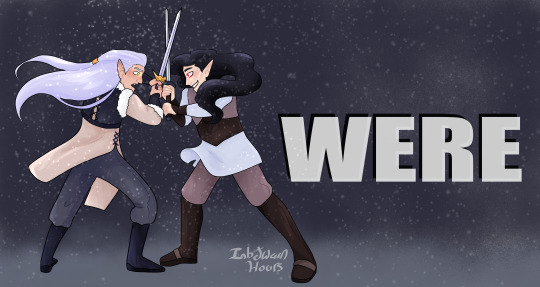
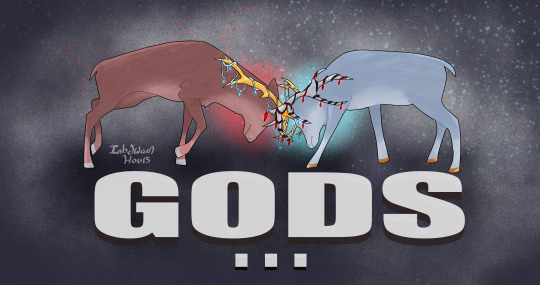



Because I am obsessed with this one line from Battle Cries by The Amazing Devil and will continue to reuse it in artwork I of course had this though for using it in comparison to the twins of Rivendell, Scott and Xornoth. As I though more about the piece it evolved into a study of the cycle of corruption and hate between brothers within Rivendell’s leadership. This fight that was born in Rivendells foundation and which died only with the kingdom itself.
Doing this I managed to put a lot more thought into my actual ideas about how the majorly slumbering pantheon that the Stag Gods herald from operates its history especially. I revisited my concepts of Alinar and Cohnel, and I made sure to keep in mind the key differences in all the brothers relationships, as well as how the corruption and championship affected them.
Below the cut im gonna ramble about the lore both canon and MOSTLY my won fanon that provides background to this piece and how it came together in my head :]
I am going to go through each set of brothers and describe their history. From their conception, to their finality, in the context of being a pair.
The Stag Gods are unique in their conception. For the sake of ages they are affectively twins. The pantheon they hail from was born in the time after the titans fell. As Pixlriffs describes in his opening to season 2, mighty titans once roamed the earn and when they fell their bodies became the lands that empires now rise and fall on today. The era of gods that Exor and Aeor were conceptualized in were some of the first creatures to evolve to inhabit the lands that these titans bodies became. The first stags, the first serpents, the first flora. The first seasons, of winter, to spring, and summer. Wilderness was born and from it rose divinity in its first era. That of the Stag gods.
When Aeor and Exor were young fawns they were nothing more than animal. Young and reckless, exploratory as they took on their responsibilities. Bringing order and chaos, winter and summer. A cycle ever chasing one another. They were so different, but they were brothers. They could not be without the other, as is their cyclical nature.
They are affectively the same age. And they grew up in a time where they and the other gods were the only sentient life around. They are neither benevolent nor malevolent gods. No deity is, because those are mortal terms. Their understanding of mortality is comparable to human understanding of ants. They work, and they have built great things have systems. But everything looks so simple from the gods view.
The gods take care of mortality in the same way a man may take care of his dog. The dog is loyal and loved and cared for, but it is still only a dog. When the corruption first rose it ugly red shades across the land the gods grew weary. It threatened their precious pets, destroying mortalities hard work and making them ill and crazed. So the pantheon banded together and supposedly defeated The Corruption. It took the full strength of most, and so most of the pantheon fell into slumber. The Stag Gods among the few who continued to stand.
The brother stags founded Rivendell high in the mountains, a place to protect and watch over the mortals they personally had found preference in, the elven civilization. For a long time the elves worshiped both stags, but as time went on a preference for Aeor and his orderly ways grew. Exor grew jealous, and emboldened by the last remnant of The Corruption which has laid in wait for it time to rise again, he acted out. And as more and more conflict grew between the brother stags, the corruption took its hold in Exor, turning him cruel and greedy, and in turn twisting up all the gods followers as well.
We all know how this story ends. Aeor and his brother fight, divided finally, futile, by The Corruption, and Exor alongside his followers are banished to the mountain peaks to waste away in the caves.
Alinar and Cohnel are the next of the brothers. They are third generation Rivendells citizens. Alinar is older than Cohnel, by some years. They come from a comfortable family, nothing so noble, as the country flourishes around them. They play together in the streets, Alinar leaning Cohnel by the hand too keep him from running off. The play in the snow and as thy grow older dare to hike further and further into snowy peaks. Till one day they would discover the ruins of where Exors fanatics were one sealed away.
Alinar would urge them to leave, taking Cohnel home. Enough warning in old tales told as bedtime stories enough to ward him away. But not Cohnel. Ever cursed with youthful curiosity he would return alone. And he would not be seem for many months. Declared missing Alinar would mourn, grow, and push himself to help others where he could not his brother. He would join the council leading Rivendell, where he would be in a position to see the rampant increase of missing persons. The unease and fear it drew throughout their kingdom.
And under oath to protect the people Alinar would set out, meet his brother again on the battlefield. Now corrupted from his once boyish youth Cohnel is nothing of the baby brother Alinar once guided. Still, the boy has their mothers nose, and the same eyes. Alinar is weak in one moment and decides he cannot kill his baby brother. But he is a member of the council and a hero of the people. Aeor gives him help, guides him as his champion and brings him to the conclusion of a banishment spell. So he does just that, never to see his brother again, and goes on to become the champion of Rivendell. Heralded as its first king.
The final set of brothers are best known I presume. Scott and Xornoth, twins of Rivendells monarchy. Xornoth is older, and that is important to me as I often debate giving them a real age gap but I will stick with the twins lore for now. Descendants of Alinar. As members of the monarchy these brothers lives are different to the others. They found more solace in one another as refuge from responsibility and ridicule from their parents.
Both princes grew well educated, and with that they knew even more of their history than perhaps the general public were privy. Their ancestry, and that of the gods more available. Both were devout in their academics and their religion, as they were brought up to be. However a key difference was Xornoths ability to push boundaries, push questions. Always a thirst for more, more more- especially in the way of knowledge. They drudged up arguments with mere curiosity and while Scott entertained his brothers thoughts, he was much more well behaved. Not risking mentors or parents good temperament for answers when he could easily keep his mouth shut.
Still, he encouraged Xornoth’s curiosity, even as it grew more fascinated with more forbidden insight. More curious to Exors scorned history. With so much historical documentation of devotion to Exor destroyed out of fear a long, long time ago Xornoth only grew more despertaly curious. And when they found note of old banished groups of ollowers in the mountains he pleaded with Scott for a coverup.
Scott allowed it, the two sneaking away and Xornoth returning with an ancient tomb. Obsessive was what Xornoth was turning into, red glint in their sharp eyes growing more by the day till finally something gave. Where there was once passive irritation and distain Xornoth grew quick to anger and violence. Till finally the ysnapped, and in a late, fitful arguement with their parents they killed them both.
Scott had not an idea what happened. Not until he awoke the next morning to maids screams. His parents dead, and his brother gone- nothing more than a banishment sigil burned into their bedroom floor as indication to where they had went. Scott would be coronated, and with his kingship he only became more devout to Aeor.
Scott believed his brother dead, and moved on for over a decade till the events of season one as we know it. Xornoths return, the understanding of what had happened to them. Being championed, and capturing his brother. Hoping dearly to find a way to undo Exors influence. Till finally out of time the two battle on Rivendell peaks, overrun with corruption.
Scott decides to be selfless, killing himself on the rune blade. and As he bleeds out Aeors presence withdrawals from him. As Aeor withdrawals, so does Exor. Until it is only Scott, delirious with bloodloss and pain. Until it is only Xornoth, finally in their right mind after decades of corruption and divinity puppeteering them. And they see their little brother, and know they had failed to protect him from themselves when they ran away. There is nothing left to be done as Xornoth moves to hold Scott in their last moments. Offering the smallest comfort as death takes them both by virtue of their connection.
The cycle of brother, loved and corrupted, which started in the seeds of their kingdoms foundation and that has withered with its end. It is all finally over.
#smajor#dangthatsalongname#xornoth#esmp alinar#esmp cohnel#esmp aeor#esmp exor#esmp#empires smp#empires smp 1#empires season 1#esmp rivendell#hourspost#hoursart
672 notes
·
View notes
Note
re the ask about stede not doing enough to make up for ditching ed - did it not balace out that ed tortured his crew for weeks and tried to kill lucius? idk why everybody is woobifying ed as if being sad or having a hard life is a justification for any of the shit he did like he has autonomy and chooses to behave the way he does when stede leaves. same goes for blaming all of eds actions on izzy as if izzy forced him to do anything? i think its weird and doesn’t do justice to his intentionally morally gray dimensional flawed character
okay so anon you are bringing up multiple things and conflating them, i think so let's take this one bit at a time
re the ask about stede not doing enough to make up for ditching ed - did it not balace out that ed tortured his crew for weeks and tried to kill lucius?
so first, let's be clear: ed's actions towards other people do NOT balance out stede's actions towards ed. that's uhhhh not how it works. when it comes to if stede did enough to make up for ghosting ed, that is a situation resolved only within ed and stede's personal relationship. stede leaving doesn't justify ed being callous and later cruel to the crew, but likewise, ed being callous and later cruel to the crew doesn't mean stede didn't owe something to ed if he wanted their relationship to work.
now let me further say that...i don't think that ed tortured (members of) stede's crew for weeks. in fact, i don't think he's physically harmed any of the crew aside from izzy, and I would argue that his dynamic with izzy is it's own special beef. if anything, i would say that between season 1 episode 10 and season 2 episode 1, ed's been a classic overachieving boss pushing his staff to the breaking point by having them work long shifts with no breaks and low pay.
this is not good, by the way, i am not saying he is being a good boss; kraken ed is fully that shithead boss who schedules 13 hour days and thinks a pizza party or donuts in the lounge make up for it. izzy tells him morale is low and he asks if they got cake, and then if they want drugs. the crew does not describe being worn down from specific fear of ed - they are worn down by day after day after day of endless raids without breaks; all the worst parts of piracy (the raids, the violence, the death) with none of the benefits (the break time between targets, the shore leave, getting paid).
again i say this is not good because it's not, but also, i think the fandom has marinated in this idea that because ed took izzy's toe he'd be doing all kinds of violence to the rest of the crew, and s2e1 doesn't really bare that out. they're shocked and horrified that he actually shoots izzy, and none of them are missing bits - in fact, the behavior is apparently so unique to izzy that they think izzy and ed have a toxic relationship. if it was any of them getting that, it wouldn't be an intervention getting plotted.
(he did for sure try to kill lucius though, which is why i'm glad lucius got to dump him overboard lol. lucky lucius. izzy tried to kill stede twice and stede didn't even get to stab him once.)
idk why everybody is woobifying ed as if being sad or having a hard life is a justification for any of the shit he did like he has autonomy and chooses to behave the way he does when stede leaves.
now half the fandom is woobifying ed because we love him and like him and also because the other half of the fandom is wildly racist about him so.
but, also, it's important context that the showrunner describes ed's actions as "a bit much" and "not entirely inappropriate". in the context of their environment, most of what ed did is not that shocking or stunning; he has hurt people, but even the people he hurt move on from it relatively soon, and we can see from spanish jackie (who doesn't give her employees enough money to pursue their own ambitions/perfectly fine with killing a husband to remove an obstacle) and ned low (literally all of that in episode 6) and izzy (in the like ten minutes he was captain and forced people to season his food and threatening folks with going hungry for laughing at him) that pirate captains are, generally, pretty shit, actually.
roach and archie at various points express sentiments that show this is all pretty normal for pirates; it's not that ed wasn't a dick, it's that he wasn't uniquely evil or fucked up. it's also that his behavior is sympathetic to many people because the show makes it abundantly clear that he's incredibly depressed and suicidal, and while it's definitely NOT okay to hurt people because you're in a bad way, the show is definitely more geared towards "even when you do all that fucked up shit, you still can be deserving of love and compassion if you reach for it" rather than "if you do fucked up shit you instantly are on the death list".
same goes for blaming all of eds actions on izzy as if izzy forced him to do anything? i think its weird and doesn’t do justice to his intentionally morally gray dimensional flawed character
izzy's not responsible for ed's actions in the sense that he put a gun to ed's head during every move, but he plays a critical role in making all that shit happen. it's like how stede wouldn't have ghosted ed if chauncey hadn't of dragged him out of bed - the festering self hatred that chauncey tapped into was there in stede, but he wouldn't have given in without a jolt from his past. the festering self hatred in ed wouldn't have broiled over into the kraken without izzy, but that was all still in ed.
izzy is pivotal in all that shit happening. if izzy hadn't of come in and jabbed ed in every sore spot he had and been a huge homophobia ridden pest that *also* threatened ed if he continued behaving in a way izzy didn't like, ed wouldn't have gone all kraken.
however, ed still DID go all kraken, so like, yeah, he did that shit. izzy is the explanation for why he did, but it's ed who did it so he has to make amends.
but also like ed is only as morally gray as literally everyone else. frenchie and roach are both in full support of torture. jim fully tried to kill a guy for throwing a glass at archie. all of them are professional murderers who make their living being the absolute living nightmares of people who are just living their lives doing their thing.
ed isn't any more morally gray than anyone else, but it's very weird how people try to make it out like ED is the intentionally morally gray character when it's just that this is a show about professional violent criminals, so the show doesn't really moralize about acts of violence.
now taking it back to the top though:
nothing ed did to the crew would change stede's need to re-earn ed's trust for ghosting him without a word and not being honest about his feelings and doubts. if ed wanted stede to atone for that, that would be ed's right as a person in the relationship - just like it would be the right of frenchie, archie, jim, or fang to want to ed to do something more before they offered their forgiveness. the fucked up shit you do to other people does not retroactively justify the fucked up shit someone else did to you. stede doesn't get a get out of the doghouse free card for ghosting ed just because ed was a dick to other people; he gets a get out of the doghouse free card because ed decides to forgive him and try again.
70 notes
·
View notes
Note
have u ever seen the
"his name has Ra in it. Ra is the Egyptian god of sun. Sun has three letters. A triangle has three peaks. Illuminati is a triangle. That means that he's illuminati"
videos?
cuz ur like that but cooler and more educative
The last line of your message means you can have chocolate pie. 💕*sets you up with a plate* I was getting a little nervous there for a second lol. I think that any book or show that causes its audience to engage so much is a great one and if someone is enjoying making connections like the ones you described, then it's their life to enjoy. I'm not going to yuck on anyone's yum but I have seen some theories that I honestly had difficulty following so I get whatcha sayin' and I appreciate the compliment.
If I said this next sentence with any other context but with regards to Good Omens, you'd all try to have me committed lol but here it is: I'm following language-related directions from The Voice of God. Literally. I have it in the works to do a post on that alone because the show is actually teaching the audience Crowley & Aziraphale's vocabulary and it's provided some keys at times as to where in the show you can find lessons in it. In S2, there's also a meta scene about it, which is the "Professor Rossignol" scene. Some brief thoughts on that and, since you were nice enough to drop me a note, also on Ra and The Illuminati while we're at it, just for kicks.
It's no good to make it evident to your audience that your main characters are speaking a secret language that they've made up if the audience can't be taught to speak it because then the meaning of what's being said is lost, right? And it is very obvious that Crowley & Aziraphale have their own vocabulary. There are a lot of examples of it but one scene, in particular, that stands out to me is 1967 because it is literally impossible to make heads or tails of what they're fully discussing unless you try to figure out what Aziraphale means by "dangerous." He tells Crowley that he's heard about Crowley's plan to rob a church for holy water and then says to him this, word-for-word:
"I can't have you risking your life. Not even for something dangerous."
What does that mean, right? If you didn't already get a sense that their words don't add up on the surface sometimes, you get smacked in the face with it in that scene. Aziraphale's phrasing puts "dangerous"-- a word with a scary, negative connotation-- in the position of a positive, cherished thing that Crowley would see worth risking his life for and the end result is that "dangerous" must mean something to them besides the surface definition of the word. [What it does is something someone else has asked me for so post on that to come.] Right there, though? You have hidden vocabulary. One of the most important scenes in the show and it makes no sense without an awareness of it. This is all long before Crowley's standing there saying "no nightingales" in 2.06.
There are other scenes where something doesn't add up without an awareness of hidden language being spoken. Why does Crowley melt into a puddle of burning goo at Aziraphale saying "We will win, you know" about Heaven winning Armageddon in 1.01? Because, as other scenes and The Voice of God's narration teach, when they're speaking of Heaven or Hell with pluralized pronouns, they're really talking about the two of them together beneath the surface. That's why Crowley's face melts into a lovesick gaze and hint of a smile when Aziraphale says "we will win"-- because Aziraphale is saying that he and Crowley will win.
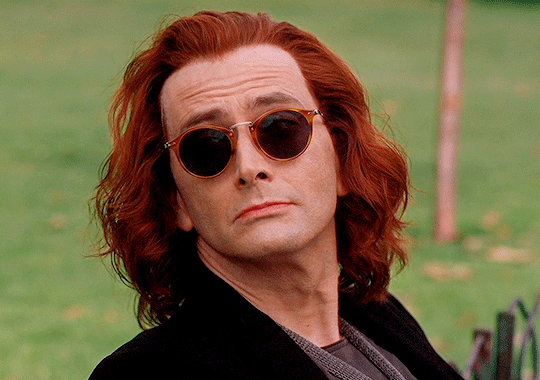
In S2, Aziraphale says he learned French "the hard way" with "Professor Rossignol" in 1760. Aziraphale already speaks French. He and Crowley, as Crowley points out in the scene, speak every language of the world. It's a nod towards how you can speak a language but a secret language like theirs is one that can be built out of words that sound familiar but are put together in a way that you need to understand in order to comprehend what is being said.
In the course of the scene, Aziraphale speaks French to Crowley and what he says is a riff on "la plume de ma tante"-- a French phrase that refers to the kinds of sentences that you are taught when you learn a new language that you would never actually say in real life. This scene is actually nodding to the "la plume de ma tante"s of Ineffable Husbands Speak and where you can find them in the series.
The reason why those sentences exist the way they do when you are learning a new language is to teach as much vocabulary as possible alongside teaching people how to conjugate verbs, etc.. This is why you are never taught practical sentences like "Excuse me, where is the restroom?" or "Yes, I would like to buy that bread, please." but are, instead, taught sentences like "Is it true that you can buy white onions at the library on Tuesdays?" lol. It's because when you are a child and you learn the native language or languages spoken by the people around you, you absorb thousands of words just by living in that world but when you are a teenager or an adult learning a new language, you start almost from scratch. You need to learn as much vocabulary as possible as soon as possible, in order to become fluent. Aziraphale says he learned some "la plume de ma tante"-like sentences (in a language he already speaks but in which he wanted to play better) from a professor whose name eagle-eyed fans already translated as meaning "nightingale" in French, right?
Nightingales (the birds) and also nightingales (the skeleton keys). The Rossignol family created The Great Cipher that encrypted communications for the French government for centuries-- they literally built a secret language. If you want to learn Ineffable Husbands Speak, the show is saying, you need to follow the nightingales. So, who taught us about "nightingale" being a word related to Crowley & Aziraphale? God. Whose sentences, at times, smack of "la plume de ma tante"-like vocabulary lessons? God. What better character to teach us what we need to know than the literal Voice of God, right? God is our Professor Rossignol.
God's 1.01 line of "The Russian cultural attache's black bread is particularly sought after by the more discerning duck" is the most la plume de ma tante sentence in Good Omens lol and the four sentences-- of which that is one-- that God says to re-introduce us to Crowley & Aziraphale in the St. James' Park scene, when picked apart using language elements things suggested by God's opening monologue at the start of the series, contain almost every element of the vocabulary, with other scenes reinforcing and adding to it throughout.
Further suggesting this is the way to go is that if you apply the same instructions to the top part of Demon's Guide to Angelic Beings Who Walk the Earth (the bit above Aziraphale's entry), you'll find the guidelines repeated-- and notes to us that include everything you would need to unlock the hidden language in the entries for Aziraphale and Baraqiel (Crowley) beneath them. I'm not just randomly deciding this is what stuff means, is mah point lol. I'm taking lessons from Frances McDormand.
As for Ra and The Illuminati, well... to date, I've seen Ra come up as one of the many, many words in Demon's Guide to Angelic Beings, which are hidden-in-plain-sight coded love letters. Aziraphale uses it in relation to Crowley. Ra is the ancient Egyptian god of the sun and was depicted as a figure that was half-bird, half-man. That alone would probably be amusing to Crowley & Aziraphale. Aziraphale referring to Crowley as the god of the sun is just romantic. The sun is a star and Crowley made them; the Earth and all life and their life on it would die without the vital warmth of the sun. There is no food and no peace and no life without it. Calling his very old serpent partner the god of the sun sure sounds like Aziraphale saying that he can't live without him.
As for the masons and Gabriel... I took it as a joke about conspiracy, actually, not something suggesting one. The bartender at the pub assumes that Gabriel and Beez are masons-- meaning Freemasons-- because he thinks that there is a local chapter that meets nearby. The bartender has made assumptions about Gabriel and Beez that add up to "not from around here" and assumes they're there for a mason meeting. Gabriel is well-dressed and clueless in a rich sort of way to the bartender-- he doesn't know what a jukebox is and he's in an expensive-looking suit. He also has an American accent so the bartender figures he's probably not a local. Gabriel doesn't dissuade the bartender from thinking that he and Beez are Freemasons because Gabriel has no idea what that is-- because the bartender said "masons" and, honestly, that actually is pretty close to what Gabriel is by his own definition.
A mason works to make things out of stone and the original meaning of the word was specifically related to those making stone walls. Gabriel was in Eden at the start-- the ultimate in stone walls built-- and he also just took Beez to see a statue of himself carved out of stone. Walls are really all Gabriel's ever overseen being built or ever reinforced or ever known before Beez. He's not the most poetic of beings but he can see an analogy there where he is the imprisoned imprisoner of those in Heaven and he just doesn't dispute it because not like he's about to tell the bartender that he's actually The Supreme Archangel of Heaven and Commander of the Heavenly Host 😄 so, letting the guy assume that he works in stone seems like a good solution, as it's actually barely a lie.
The irony is that, etymologically-speaking, the bartender is actually more correct: Gabriel, in the pub that night with Beez, isn't a mason. He's a free mason. Because he's with Beez and the two of them together are carving a path out of their prison walls. Gabriel has actually joined "The Illuminati"-- because he's been illuminated... he's been enlightened. Dude's going to be Grand Master Wizard of The Illuminati or whatever it's called in S3 and bring a whole lot more with him, Beez, Crowley & Aziraphale along the way. He consumes beverages now. There's nothing holding him back. 😂
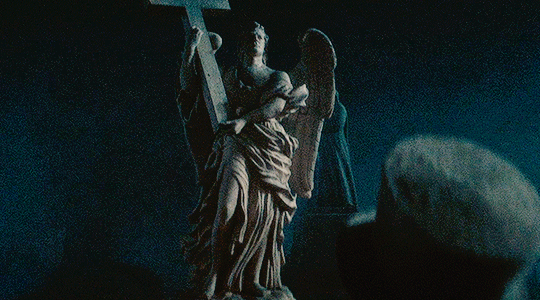
Anyway, thanks for indulging my ramblings and have a great night. 💕
#ineffable husbands#aziracrow#good omens#good omens meta#good omens 2#crowley#aziraphale#good omens s2#good omens theory
35 notes
·
View notes
Text
The kanji “kei” (系) and its usage
As I still keep seeing it being used in instances where it doesn’t make sense, I thought it would be a good idea to talk a little about the kanji’s actual use within the japanese language.
系 is commonly used as a suffix to categorize and describe various things by their “type”, therefore can also be translated as such. For example, your nationality would be “country+kei+person”, stating the color of something “color+kei+object”, describing a song “genre+kei+music”, and specifying the style of your outfit “style+kei+coord”. However, in the overseas jfashion community there still persists the misunderstanding that it means “style” or “fashion”.
So where does this misunderstanding come from?
The very first instance of “kei” being used in a fashion context overseas was “visual kei” (ヴィジュアル系). During the late 90s, western media outlets discovered the genre and introduced it as unique fashion style from Japan heavily tied to music while also translating its name as “visual style”. This was the beginning of the whole misunderstanding as visual kei is only used to label a band as “visual-type”, meaning there is a heavy focus on a visual aspect. This is also why you will have a hard time shopping for the so-called visual kei fashion because it doesn’t really exist, and what is considered that overseas usually falls under the japanese goth punk (ゴスパンク) style that bangya wear.
After this, many years passed and “fairy kei” (フェアリー系) appeared within the jfashion online sphere, strenghtening the overseas conclusion that “kei” must mean “style” and therefore refers to fashions. While fairy kei is indeed used as a name for this specific 80s-inspired pastel fashion, it’s a lot more common to see it being refered to as just “fairy fashion” in japanese because “fairy-type” is also used to describe plenty of unrelated things. Meanwhile calling it fairy fashion would have been useless overseas for a similar reason and it made a lot more sense to use “fairy kei” instead.
From that point on, the international jfashion community would coin one “kei fashion” after another regardless of the styles actually being known by those names within Japan. Searching the majority of them in their japanese spelling would result in a dead end with many not even making any sense in relation to fashion, such as “mori kei” literally referring to forest types and “pop kei” to anything that’s popular at the moment.
Basically, the lesson of this post is that there is no need to include “kei” in the names of japanese fashion styles unless they are unrecognisable without it, because you are not writting in japanese using the kanji to categorize something by its style. In context of the fashion featured on this blog, it is used to differentiate the overall style genre from the english adjective that is “girly”, but not for its substyles as their names are distinct on their own.
I hope this little language lesson was useful to my readers, and if you have any requests for other jfashion-related terms to introduce or explain - just hit me up in my inbox!
#系#kei#semi-related#japanese#jfashion#term#japanese language#japanese lesson#kei fashion#information
220 notes
·
View notes
Note
i love your E rated/smut writing. do you have any tips for writing smut?
most of these are about reality/modern-based sex writing rather than fantasy stuff where all the bets can be off!
there is literally no god word to use for balls/testicles, it's fine
USE CHARACTER NAMES. no "younger/older" woman, "darker/paler" man, just use their names especially during a sex scene
do learn some basic anatomy, please look up where the prostate is, where the g-spot is
but fanfic sex doesn't need to be instructional, you are not teaching people how to have sex. it very much shows when you write like this
fanfic is also not consent 101. it's fine to just let your reader assume they're 100% into what they're doing, and i think "unnegotiated kink" should be reserved for scenarios where the kink is spur of the moment, not just "involves kink but no explicit discussion of it" (unless they're not meant to be, which one assumes would be made clear in tags or descriptions!!)
that said, writing about discussing consent can be really fun, doesn't mean you can never do it. you just have to vibe out whether it's adding to the fic or not
talking really helps break up sex scenes, so write at least one character who's chatty lol
plan out your sex scene so you don't get stuck with what's happening next. remember you can go back to it to flesh it out/work on the pacing. honestly most of my sex scenes start on the page as a list that goes: LICK LICK CIRCLE CHAT SUCK SUCK STROKE LICK SUCK GAG SUCK TALK BIG CUM
speaking of going back to pacing, literally invoking time can help make a sex scene seem longer without saying "they fucked for seven and a half minutes". "a long moment later" "by the time X, the sun had begun to rise/fall", "long into the night"
lube is preferable but optional, even for butt stuff. sex without lube doesn't mean it's painful or dangerous, especially for experienced butt stuff doers.
spit as lube is not a cardinal sin and is miles better than things that are actually dangerous (engine oil? things w sugar like honey? baby dont give your chars a yeast infection)
olive oil is fine but it's messy and it doesn't play w condoms, but fine if you're going historical
speaking of which, from my experience people in established relationships forego condoms way quick. and in general people forget to use them all the time. again, this isn't Safe Sex 101, it's fanfic.
but on the flip side, its sexy/funny when characters have lube and condoms to hand. there is no funnier environmental storytelling than there being a bottle of water based lube in the kitchen cupboard with the peanut butter.
simultanious orgasms are a pain to time and sure they're romantic but there's other fun climax dynamics. maybe one character feels duty/honour bound to always make sure their partner comes first
come/cum? it doesn't matter, just keep it consistant per fic
similar, be consistant with your body part names, even if you use a few. e.g. you use "cunt" in narration, but character A uses "pussy", keep that consistant.
you can still euphamise genitals without it sounding like you're afraid of them - sometimes six instances of "cock" in a row doesn't flow, that's when you should be utilising your "hardness" and "shaft" and "length"
the brain is a sex organ, and all the senses are engaged during sex. you can bulk out yor sex scenes and give great insight into the character experiences by describing what they're experiences with non-touch senses (or the lack of them, e.g. when blindfolds are in the mix)
even in pwp works, you're saying something about the characters who are fucking. you can give context and inferred complexity without plot. are they familiar with each other's bodies? is this new? are they confident, or nervous.
write for you! if you are a person who experiences sexual response to erotic fiction, then a good measure of your own work is if it makes you horny to write/re-read it. there's absolutely no shame about being aroused during the process. there's no harm in taking a wank break.
20 notes
·
View notes
Text
Drop Them Bones Chapter 9: Hard and Fast
This one's a doozy...
Hard and Fast
To be sure of, without a doubt, without debate
History: In seafaring times, the term ‘hard and fast’ was used to describe a vessel that was beached on land and unable to be moved.
[Don’t lie. Absolutely none of us thought it meant that. None of us.]
So, funny thing. Since posting Chapter 8, I had a wonderful long weekend in Manhattan, followed by the worst stomach flu I’ve gotten in at least a decade. Then, after a few weeks recovering from that, I partially dislocated my knee and sprained my MCL. Full damage assessment still TBD in a couple months, but I have a care plan for now.
What I’ve posted as Chapter 9 was supposed to be ten pages max plus additional scenes, and then this happened. So, I have 6k words of Chapter 10 already because I split Chapter 9 in half, and I’ve had the final scene in Chapter 10 (originally intended for Chapter 6, hah!) written for the last three months…
I currently have 9 more chapters planned out, but as this adventure has shown me, that’s more like guidelines. This chapter would have been out sooner, but reference above, and in retrospect, this chapter’s title also describes me in seafaring times right now…
Notes
At least I’m recuperating and back to excessive research spiraling:
If you have the equipment, time, and inclination, you too can om a gator nom. I have only ever outsourced my gator dining experience to trustworthy restaurants, because I’m happy to compensate people accordingly for their labor and gator meat is fucking expensive to have shipped up north.
I’ve mostly encountered alligator fried or in etouffees in restaurants, and if you can’t source alligator or just think they’re too cute to eat (look at them faces!), they do taste like a fishy chicken, but less swampy than frog, and have the consistency of a pork chop. So, imo, you can substitute either white chicken meat or pork to about the same effects in all the recipes except the whole smoked gator. Alligator meat is very lean and easy to dry out, though (flashbacks to straw-like fried, breaded nonsense on that one trip to Florida…) The Daily Beast has an article from 2019 that goes into more detail on taste, etc. I’m not going to link to any of the butchering videos I watched to make this fic, but if you’re interested, deermeatfordinner on Youtube has a good one.
And yes, in true Louisiana fashion, the state government does have an alligator cookbook available in PDF for free. The final page notes that funds for it came from both Florida and Louisiana, and the most approximate publication date I can find for it is 1994. Its text, graphics, and ingredients definitely look like something from the 80s or 90s…
I was not tracking that discarded crocodile and alligator fat can be used to produce biodiesel at competitive prices…
I went down a lot of interesting 1700-1800s sailing history that involved the provisions given per day to British Navy sailors, how much salt was needed to brine 100 lbs of meat, and how the brining process actually worked (floating eggs and meats, oh my!) The average alligator yields about 40 lbs of meat, so all the proportions and weights for applegators came from multiplying that by three, then adding on more layers of fat than an alligator would have because applegators can also go out in the deep sea. Yes, I know this is a fanfic for fantasy pirates on an imaginary planet. If Oda-sensei can say they’re all stronger because gravity, I can make chonky applegators.
Curing meat Wikipedia article; Quora entry (of all things) on sailor provisions; Colonies, Ships and Pirates blog; and an NIH paper with some science of curing meats; plus a definition of pellicle; and some historical pre-refrigeration context. Salting meat Wikipedia article and smoking meat Wikipedia article. And of course, once the fancy bougie restaurants start using salt water, it’s cool again.
If you don’t have a smoker at home, here’s a stove-top smoked salmon recipe that could work with any type of fish (though, I don’t think a sweet cure would really go with white fish).
How to dehydrate food without a dehydrator ideas
Making a ground oven: I actually learned about this technique back in anthropology of food, as it’s one of the oldest cooking methods that we know of, and I’ve always wanted to try it. Darn you, local fire ordinances.
Random fandom trivia: If you’re a fan of 911 Lone Star, you may remember the first (I think) season episode of a family ground cooking in their backyard and their racist neighbor being a dick about it then getting a righteous comeuppance from the team. Is it over the top justice? Yes. Is the drama hilarious? Also, yes.
They use a technique in this chapter that I based off a New England clambake set up. Mainly, a pit on the beach with seaweed, hot rocks, and a wet sail over top, covered with sand. General bake concepts and times came from here (if you can read it through that horrible font…)
Sustainably harvesting seaweed. Modern Farmer has a pretty informative newsletter I’ve been subscribed to for a couple years – It’s an interesting read if you’re into agriculture news (food-related technology, regulations, innovations, etc.) and like to know more about your food supply chain.
I didn’t know how to make sausage before. Behold, basic sausage tutorial!
Recipes bludgeoned in the making of this chapter:
I have never cooked gator meat or a whole pig, but here are recipes that sound like horrifying fun:
Whole Smoked Gator
But also, whole pig ground cooked
Kalua Pork
Alligator Jerky
Songs:
#one piece#one piece live action#zosan#opla#straw hat crew#drop them bones#drop them bones notes#foggynite#Spotify#SoundCloud
20 notes
·
View notes
Text
«Rita of Gokkan» Ch.19
eng translation by me
ch: [tag] [2-3] [4-6] [7-9] [10] [11] [12] [13] [14] [15] [16] [17] [18]
timeline: ep5 (Toufu ch1)
Rita and Kaguragi test each other on what the other knows.
contains TV SPOILERS past ep5, assumed reader is up-to-date at ep43
*If you are a newcomer and wanted to read the manga along with its corresponding episode, you will only get context for what's hinted in this chapter much later in the show.

t/n:
p4: This bugnarok is pronounced "by-EH-jim" not "bae-jim" ... based on a fly (ha-EH)
Kaguragi addresses everyone as "-dono" but sometimes Rita as "Sovereign Rita". I'm putting Rita-sama and Rita-dono both as "Justice Rita". Normally I'd be inclined to keep the honorifics but since I already used the English form before I should stick to that and subs group conventions. ("-tono/-dono" is an antiqudated suffix that is only used in official documents nowadays. In history, it meant respect for those above you but nowadays it's used by the higher-rank to address those lower politely. Genderless, lower than '-sama'.)
Something about Rita's speech pattern is they tend to use a lot of kanji, as part of their solemn personality and regular legal jargon. I lack the context to evaluate how advanced Rita's kanji are to the average Japanese but the general sense of Rita having a more archaic/complex vocabulary is evident.
holding my urge not to put a ! in every Kagu speech bubble
p14: Kagu's reation to hearing Rita saw Suzume's figure: ……はて? -> long pause, [lit. 1. well; let me see; now (used before sentences expressing a doubt) 2. dear me/good gracious]
ch19:
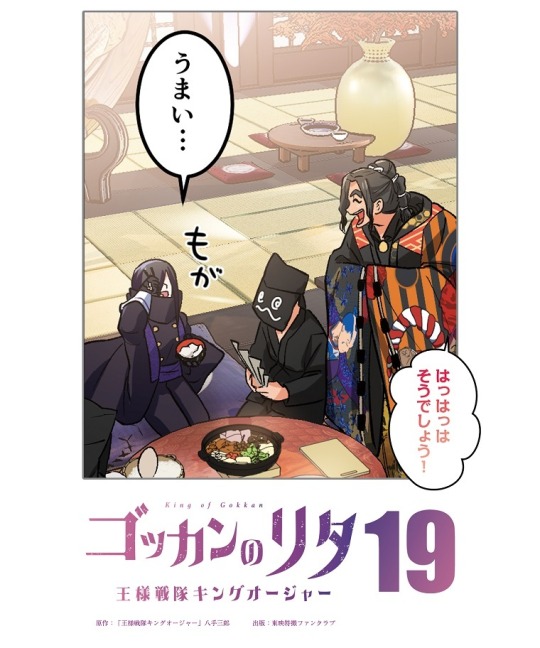
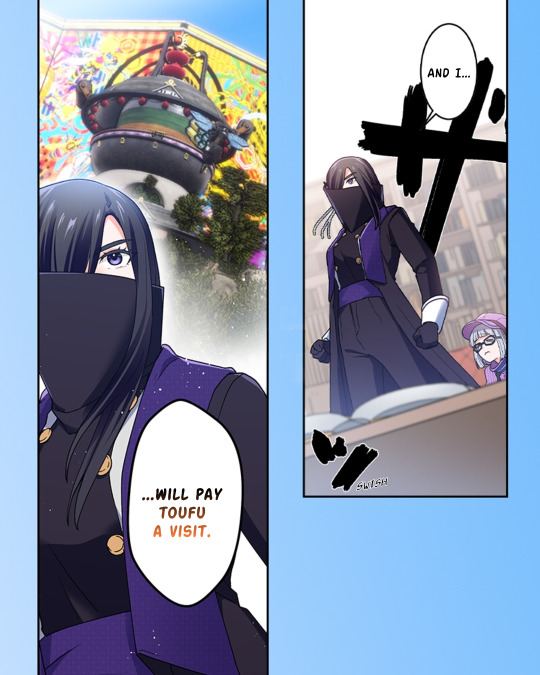
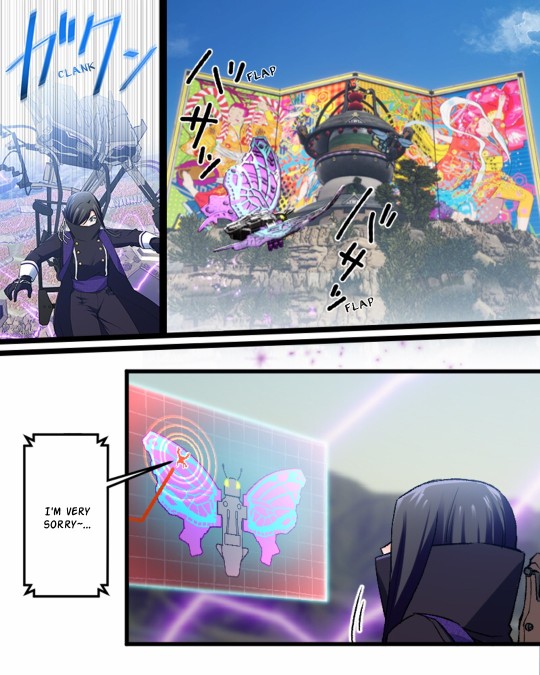

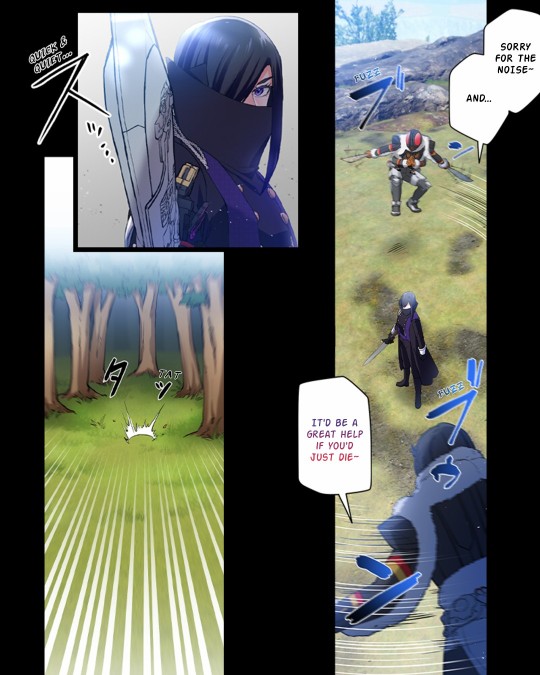
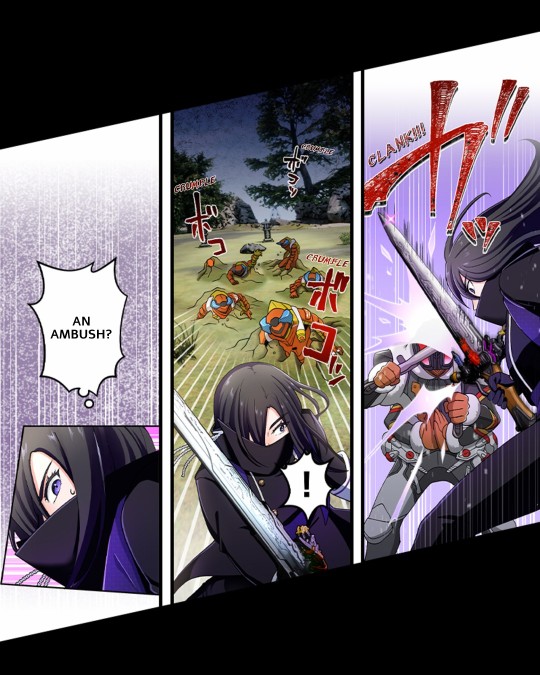
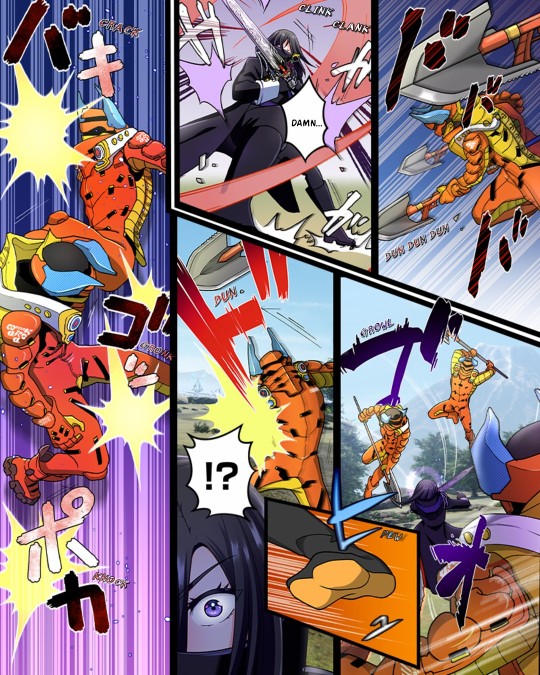

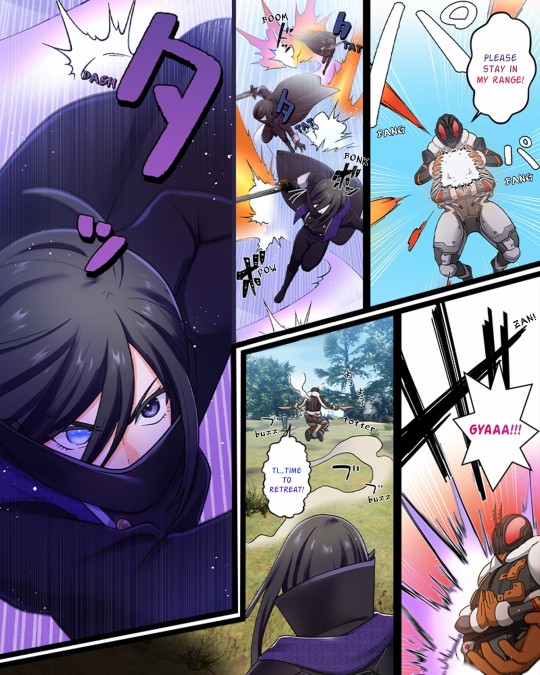
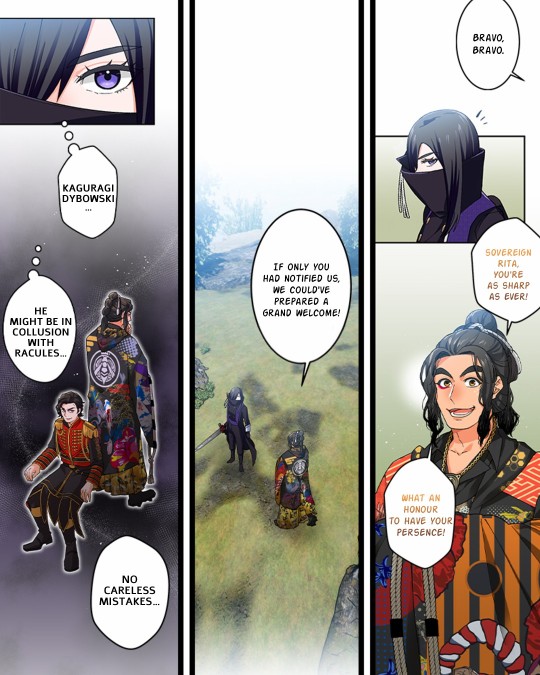
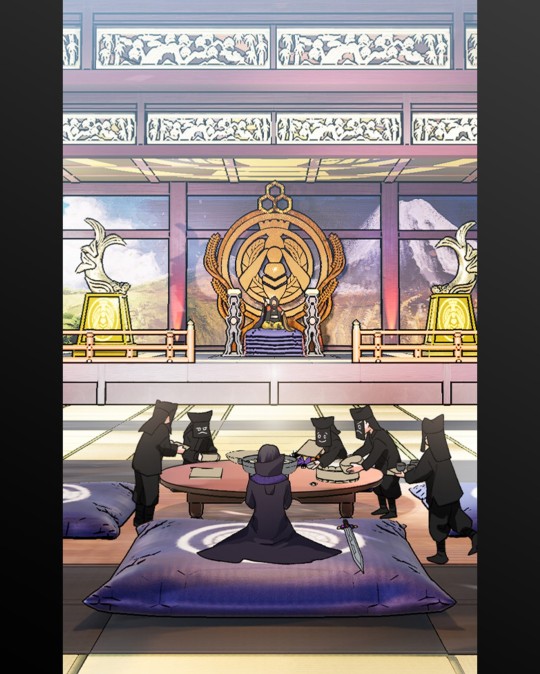
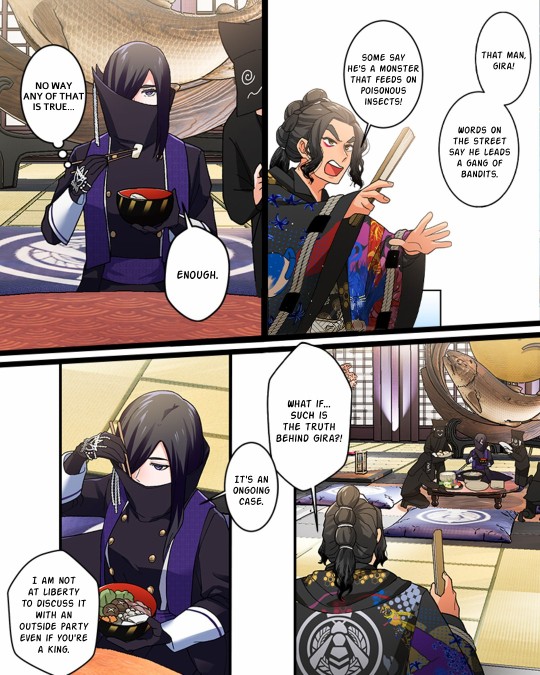
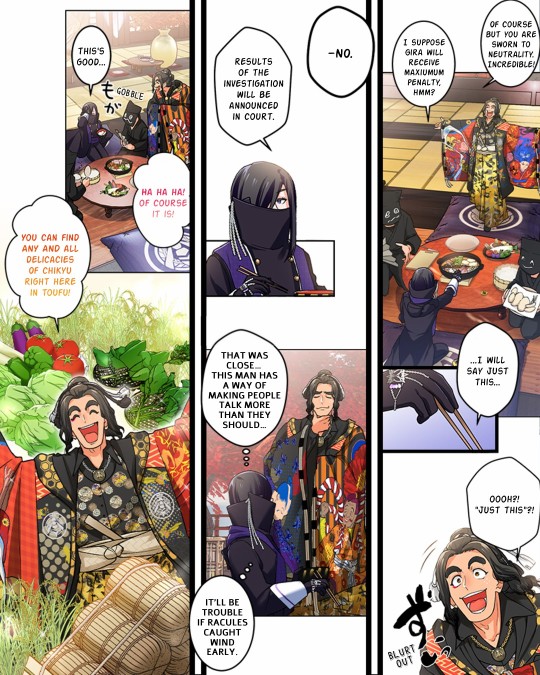
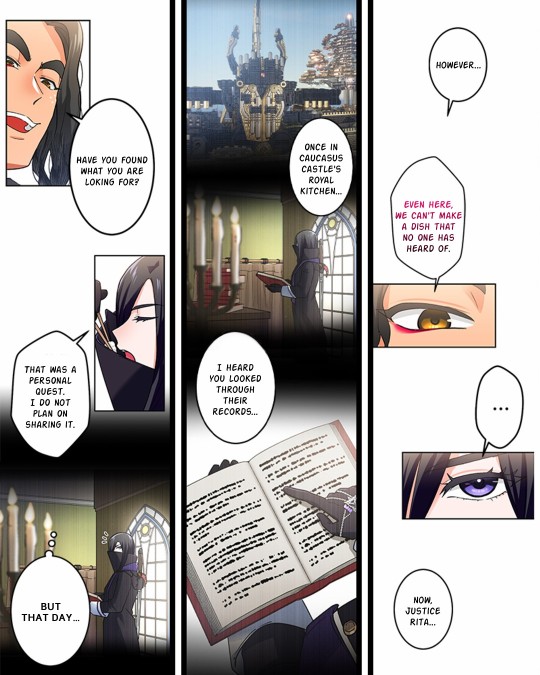
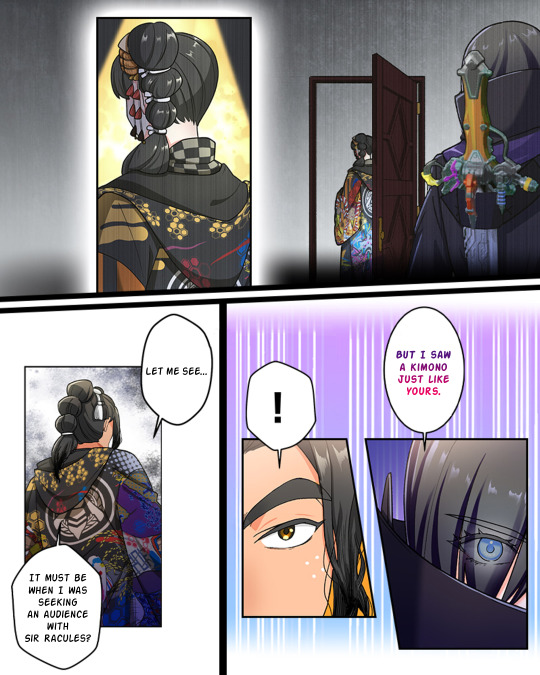
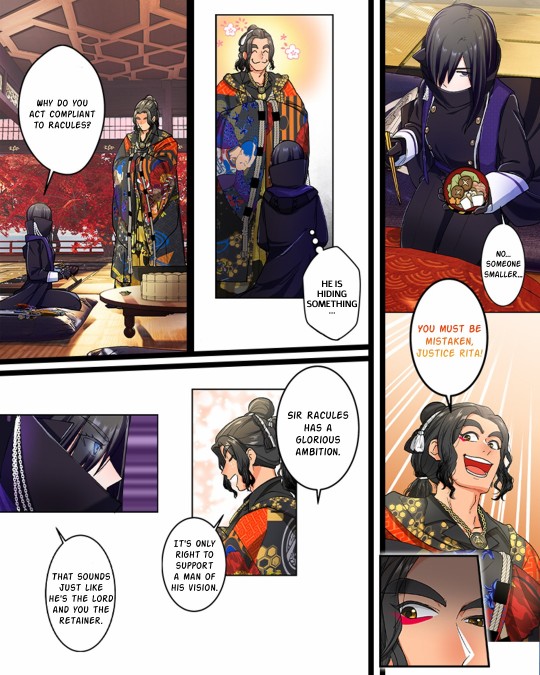
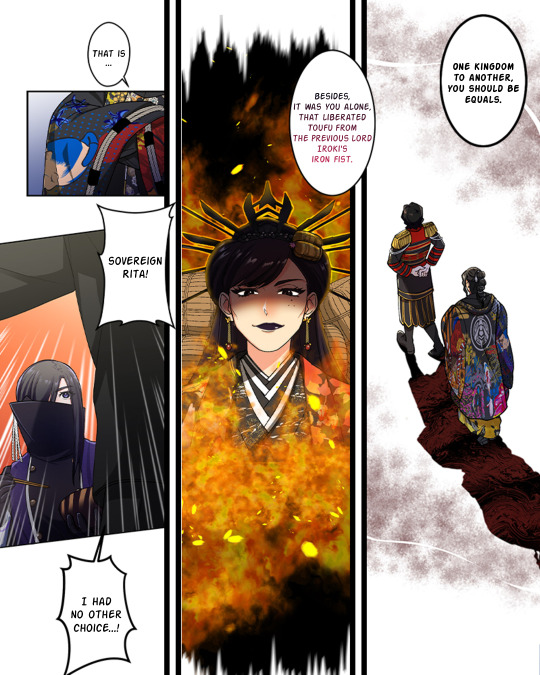
t/n part 2:
p9: わざわざお出まし恐縮(きょうしゅく)です [lit. my apologies for making you come all this way.] -> What an honour to have your persence!
Here it is! the east/west cultural difference! Keigo is a big challenge for me as a learner already, let alone a translator. There's no direct dictionary substitution and it really depends on your intuition with usage in either langugaes. The keigo here is humble-type, while to make it sound natural in English, instead of reflecting your own incompetence, you are flattering the other party. In the next line, Kaguragi says because Rita came unannounced, they were inadequate in failing to preapre a welcoming committee. I think the scarcasm is there in English too, but I just feel it's more insulting to imply Rita is not exactly welcome while initiatively taking the "weaker" side (Kaguragi's gaslighting, what's new).
p13: learner's note: the royal kitchen is called 厨房(chuubou) while the word for kitchen I knew was 台所(daidokoro). Research shows 厨房 is a professional kitchen like in a restaurant and 台所 is the one at home. Katakana Kitchen is also in the vocabulary to mean a modern, western-style industrical kitchen. Chinese has lost the distinctioin and uses 廚房 (note!: an extra dot above 厨) for both home or workplace.
p16: I interpret Rita's first concern is in maintaining equality between the kingdoms. A duo alliance between ❤🖤 is only detrimental to a five-kingdom one they are working towards: small circle, and increased hostility from 💛💙 if they believe ❤🖤💜 is their small clique. Yet it is interesting Rita raised the question out of personal curiosity. Remember in the beginning there was this, feeling, ❤🖤💜 are seniors and they've known each other for longer? Now we know Kaguragi is actually Rita's junior in terms of order of sucession. Now they could've what he was like prior to taking the throne. Notice how they never describe him as a liar. Maybe Rita does find it odd a man of his capability feels the need to bootlick Racules.
Onomatopoeia words this week:
スッ(Suu) an action done suddenly without sound
ボコボコ(boko boko) 1. sound of hitting a hollow object 2. uneven (surface) 3. to cause damage with full force
バキバキ (baki baki) hard objects shattering/breaking/cracking ポカ(poka) 1. repeated hit with something heavy i.e. fist/bat 2. feeling of warmth
よろよろ (yoro yoro) (adv., not a sound) staggering
もがく (moga ku) (v.) struggle/wiggle impatient -> here means eating frantically (because food is too god)
ずいっ (zui) (adv.) straightforwardly, readily, without hesitation
alternate translations:
p9: No careless msitakes… -> Better keep my guard up… / Better stay alert…
p11: No way any of that is true. -> What a load of crap. (intuition lol)
Script:
p1
(18lp)
p2
「バサッ バサッ」
「ガクン」
すみません~…
バエジーム
お騒がせしております~
「ゴゴゴ…」
くそ… バグナラクめ…
どこにでも湧(わ)いて来る…
p4
うるさくてすみません~ そして…
「ブ ブゥン」
死んでいただけると助かります~
「ス…」
「タッ」
p5
「ガッ」
「ボコ ボコ ボコ」
待ち伏(ふ)せていたのか
p6
「ドドド」
「ガガガ」く…つ
「バキ ゴ ポカ」
p7
ギヤ
「ズンッ」
トウフ国の黒子軍団…!
今だ!
p8
撃(う)たせていただきます
「パ パ」
「タ ドッ タ ボッ ボ」
「タッ」
ギャ
「よろ よろ」「ブブブ」
てっ… 撤退(て���たい)です~!
p9
いやいや… 素晴らし腕前
さすがリタ国王
わざわざお出まし恐縮(きょうしゅく)です
前もって言っていただければ迎えの用意いたしましたのに
カグラギ‧ディボウスキ…
こいつはラクレスと通しているようだが…
油断(ゆだん)は禁物(きんもつ)だ…
p10
p11
して ギラという男
強盗団(ごうとうだん)の親玉(おやだま)という噂がありまして
毒虫(どくむし)食にしている化け物なんていう話も
もういい
そんなわけないだろ
もしやそのご様子まさかギラの正体(しょうたい)をご存じで…!
調査(ちょうさ)中だ
たとえ王でも外部の者に話すわけないだろう
p12
さすがは絶対中立の王 素晴らしい!
察しますに最高厳罰(げんばつ)処分(しょぶん)ですね
…ただ一つ言えるのは……
おお!?言えるのは!?
—いや
調査の結果は法廷(ほうてい)で明らかにする
危ない…どうもこいつの前でもしゃべりすぎる…
ラクレスに感づかれては厄介(やっかい)だ
うまい… 「もが」
はっはっは そうでしょう!
このトウフには世界中のあらゆる食が揃っております
p13
ただ…
聞いたことない食事は出ませんが
…
そういえば リタ殿
以前(いぜん)コーカサス城の厨房(ちゅうぼう)で
調べごとをされていた…とか
調べもの見つかりましたか?
個人的な調査だ 結果を話すつもりはない
そういえば あの時…
p14
お前とよく似た着物を見たが
!
……はて?
ラクレス殿にご挨拶にうかがったときでしょうか?
p15
いや… もっと小柄(こがら)な…
それはリタ殿の見間違いでしょう
なにか 隠しているな…
お前はなぜラクレスに付き従う(つきしたがう)
ラクレス殿は素晴らしい志(こころざし)をお持ちの方
であれば協力するのは当然です
それにしてはまるで主従(しゅうじゅう)のようだ
p16
国同士は対等(たいとう)な関係のはず…
それに前王イロキの悪政(あくせい)から解放したのはお前の独力(どくりょく)だ
それは…
リタ国王!
これは仕方がないのです…!
38 notes
·
View notes
Note
Oh hey! Another note about the highly clinical language thing:
So we have a really hard time explaining our symptoms to doctors. But we sometimes come across descriptions that match up perfectly with our experiences. So we start to use those descriptions to give an explanation. And often enough, we will forget the specifics of what led us to find that explanation so good. So we will rely more on the clinical description.
For example, executive dysfunction. We have really bad times where we just can't get up and do something. Some sort of mental block or feeling exhausted without lacking energy. But when we simply try to describe this to a doc in our own words, they just hear depression.
Which, is like the point of clinical language right? To be precise? Especially with how it take folks an average of 6 years to get diagnosed, I imagine a lot of folks using clinical language do so because they've had a lot of time to refine their words for their symptoms and struggles into that precise language.
-Faye
Yeah, I totally get that. I imagine a lot of people use clinical language for that reason.
I do kind of see the perspective of the psychiatrists on this too though. I think it's reasonable to want people to describe their experiences themselves instead of relying entirely on the jargon.
I was doing a write-up on another Imitated DID article. Overall, the paper has a lot of misinformation, a lot of bad practices for determining who is or isn't a system. And is really only better than its predecessor in the way that it wasn't actively sexist in shaming its subjects, or trying to paint patients as monsters out to slap malpractice suits on innocent therapists. 🙄
There were some nuggets of wisdom hidden in there though...

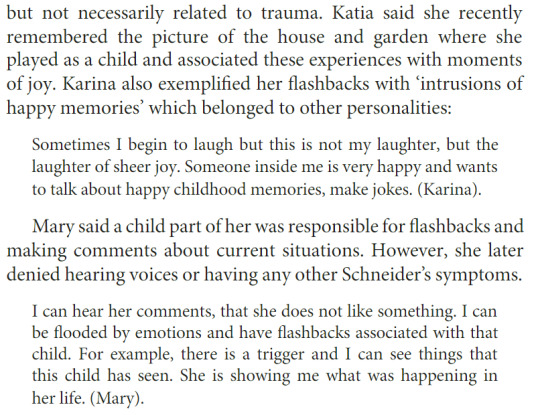

I think this is actually valid, even if I have other problems with the above lines.
While patients shouldn't be dismissed for using clinical jargon, if I were a psychiatrist, I think I would want to make sure that they were using that jargon correctly.
Heck, I'm not a psychiatrist, but still think it's important when talking to people and explaining different experiences that we're on the same page on what different words mean. Especially when those words are complicated and meanings change based on context.
Way too many psychiatrists will take this too far and decide to completely dismiss someone for using clinical language, which is gross and actually ableist.
But you also want to make sure that when someone is identifying with PTSD and describes having "flashbacks" that they're using the word the same way you do, and aren't referring, for instance, to pleasant memories.
...
Okay, now I'm going to comment on the quoted lines, and how I think it's indicative of the psychiatrists failing in the reverse way.
Because I can't simply post the screenshots without calling that out.
In the case of someone using clinical jargon, they expect elaboration because they understand that someone may not understand how jargon is used by clinicians.
But with Mary who clearly describes people in her head talking to her... they dismiss her because she denies hearing voices.
To me, it sounds like Mary simply didn't realize that voice hearing in psychiatry could include mindvoices.
So while Mary is dismissed in one instance for not using the clinical jargon correctly (flashbacks) they also dismiss her described experiences in another when she likely simply misunderstood their jargon. (Voice hearing.)
...
And so I think currently there's a huge problem where if you describe experiences without knowing the clinical jargon to accurately illustrate them, you'll be dismissed or misdiagnosed. (As with your own problem with doctors interpreting your executive dysfunction as depression or Mary's voice hearing being dismissed because she didn't call it voice hearing.)
But then knowing too much makes doctors think you're faking and just reading your symptoms off of the internet.
It makes this ridiculous paradox where you need to jump through hoops just to get doctors to believe you.
There's no way to win. At least not reliably. And it all sucks.
#syscourse#psych critical#psychology#psychiatry#mental health#therapy#plurality#plural#multiplicity#systems#pro endo#pro endogenic#ableism#disability#neurodivergent#system stuff#sysblr#plural system#actually plural#actually a system
46 notes
·
View notes
Text
Mistakes Are Made Chapter One Dialogue Breakdown
This was hard to make it turns out. A combination of "how do i format this" and trying to comprehensively summarize the thought processes and decisions going on. I think this works though.
Honestly, this sort of thing would probably work a lot better as like, a live conversation but we work with what we've got XD
I won't be including every bit of dialogue from the chapter but it will be most of them.
Disclaimer that this isn't a "How To" or any kind of "you should do things this way" this is just an explanation of what I put into my writing, and dialogue specifically. Also that I write in limited first person most of the time, so in a way, all the narration can be considered dialogue and as examples of character voice.
This is also only the first part of a long story that is intended to a) be re-readable and b) involve a lot of discovery as the story progresses, so a lot of the decisions I made are based off of things that will come up/be revealed later in the series. I will be talking about those, sometimes with no helpful explanation, sorry XD
I'm using color coding to specify what parts I'm talking about at any given time, so hopefully that helps.
This is going to be a long, wordy post, its entire point is to be an insight into the intentionality and consideration that goes into writing dialogue for me, if this isn't something you're interested in, absolutely pass it by. It will also likely "take some of the magic out of it" for some people. But I like to think that it might also add a bit more magic to it for others. So here we go!
On with the show behind the scenes! [AO3 Link to the Chapter] if you want to follow along there with more context to the selections.
"Hello, Jimmy!"
He manages to clamber out of the fountain without tripping and falling flat on his face at least. He splashes Katherine in the process, where she is hovering off to the side but he can't really be bothered to worry about that. All he can manage to do is stare at Sausage's smirking face.
"Hello, Jimmy!"
Katherine's greeting is much less mocking
Starting off with the very first dialogue of the chapter, which doesn't occur until a few paragraphs in and then proceeds to be the exact same line said by two different characters.
This is one of the times that I am heavily relying on the fact that I am writing fanfiction and these greetings are words that we hear the characters in question (Sausage and Katherine) say multiple times. So I don't go into much detail with dialogue tags, counting on the reader to fill that in themselves. Even if they/you aren't imagining the exact tones I had in mind its a fairly easy extrapolation that these are said in wildly different tones. The emphasis on Sausage's is to imply the more mocking/antagonistic tone, helped along by the mention of his expression, but can also just convey that its louder and more emotive (As Katherine is trying very hard to be OfficialTM in this chapter) Also describing her greeting as "less mocking" helps fill in the appropriate tone for Sausages retroactively.
"What is he doing here?" He jerks his chin at Sausage, who is still giggling like a child. He sees Jimmy looking and grins at him, all teeth.
Behind the mask, Jimmy bares his own teeth and takes some comfort in the knowledge that he has more of them; and they are sharper.
This is the first instance of Jimmy's inhuman body language being used as an extension of the dialogue/conversation between the characters. The use of teeth as a threat being a hybrid trait.
Sausage's smile is also part of this, something that isn't actually said in this chapter but will be demonstrated later on is that, as the ruler of a kingdom with a heavy hybrid population, Sausage knows this and his own body language is chosen accordingly.
Sausage keeps giggling and Jimmy can barely hear it beneath the roar in his ears. He leans down to try and whisper into the faerie queen's ear.
"I really need your alliance right now, Katherine." He hopes his desperation doesn't show in his voice.
She gives him a reproving look that throws him right back to his brief time spent in a classroom. "I'm allied with everyone, Jimmy. You know that."
This is the first example of really incorporating distinct character voices into the dialogue. I'm a liberal user of italics and in this case I'm using them to indicate emphasis where the ccs tend to stress their words to encourage assigning that voice to the dialogue itself. These are also, if not direct quotes from canon, very similar to actual things the ccs and their cubitos have said so it isn't exactly what I would consider heavy lifting.
Jimmy at this point is still fully informal. He's surprised and he's talking privately to a friend.
This is also more natural dialogue from Katherine, whose exasperation with her friend is partly overcoming her attempts to be Formal Faerie Queen.
I'm trying to keep the early dialogue fairly simple and close to canon voices because that way I can transition slowly and naturally into slightly different voices that suit the atmosphere while also preserving their more casual voices as the way that they talk when they are more comfortable and in less official settings. Setting up the contexts for different manners of speech is a big thing in this chapter overall.
"He invaded the Swamp," Jimmy hisses, his ear-fins flaring, ignoring the shudder down his spine from her use of his Name, even in part. "He crossed our borders. Again. He's threatened war." He's no longer whispering by the end, standing to his full height, shoulders back, sword hand by his shoulder.
"And according to him, you've threatened it right back!"
Another instance of emphasis on Jimmy's inhuman body language.
This bit is actually more about Katherine than Jimmy. It does show a bit of Jimmy's sensitivity to magic but more than that, it incorporates Katherine's willingness to invoke her own flavor of threats, even in casual conversation with friends.
This is the first real deviation from canon dialogue in the entire chapter. This is the blending point where I'm taking the characters voices and using them myself instead of just channeling the pre-existing ones. The emphasis for this was important to me to try and keep it Jimmy's voice saying the words.
The body language here is a physical representation of Jimmy's shift from more informal speech to a more tense and emotionally and politically fraught situation.It's also the transition of Jimmy taking this from a private conversation to a more public one, now in earshot of both Sausage and Katherine's guards and staff. He's beginning to speak more as The Codfather than Jimmy and his physical stance is the biggest indication of that.
This is Katherine's last "private conversation" line and is, again, indicative of her frustration with her friends and the situation they have put themselves and everyone else in. It's a fairly sharp statement, geared to indicate that she is not really on Jimmy's side here. ("all sides" = "no sides" and a part of Katherine knows that, even if she refuses to admit it out loud, mostly because it is a role she has trapped herself in and can't leave.)
Sausage recovers quickly and shakes out the fur lining of his coat. "Is it just me or does it smell fishy in here, now?"
"Sausage," Katherine looks disapprovingly back over her shoulder. "That's rude."
"Oh," Sausage blinks at them both, "I'm sorry, Jimmy, I didn't realize."
Jumping ahead a bit we're in the "polite conversation because political masks" phase of dialogue.
Sausage is Not Being Polite. This is his attempt at "polite rudeness" but he's not very subtle in general so its blatant enough for Katherine to call him out on it. It's also a continuation of Sausage speaking more informally in general. He has something of an upper hand in the situation, and an abundance of bravado, and that is reflected in the way he talks. (Sausage just also has a very distinct voice in general that is already leant towards melodrama which works very well for the au's setting as a whole)
His apology is also disingenuous. In retrospect I should have probably used some italics or some other indicator to help convey that. (I might go back and edit something in. I do that sometimes on AO3. Major edits get notes made at the chapter end but minor fixes happen a lot.) He makes the "apology" and that connects Jimmy to his original statement, even if it hadn't been blatantly obvious.
"Oh, this one is new!" Sausage immediately changes the subject, pointing at one of the skulls hanging on the wall of the hall. It's some kind of middling-sized land animal...a sheep maybe? with poppies filling the eye sockets and woven in a crown, there are delicate lines of gold painted across the surface of the bleached bone.
Katherine beams, her irritation at the rudeness forgotten (or at least set aside, fae never truly forget breaches of etiquette) "It is! It's a gift from a childhood friend," she looks fondly upon the skull for a moment. "We've been reconnecting lately."
Sausage nods sagely, "It is always good to spend time with your friends."
"It is," Katherine's ears twitch and her wings flutter briefly before she resumes walking. "Which is why we are going to fix this."
This is a slightly better attempt from Sausage at maintaining political etiquette by complimenting the host. A distraction and a peace offering.
And this is the first mention of Scott in the chapter, in what I am now realizing (it was not intended that way but here we go) is a context that kind of foreshadows his role of peace offering. It also is an establishing line for Katherine and Scott's relationship, as well as a nod to their short-lived plushie business (my beloved) from canon.(And the adaptation of it that exists in the au, which will come up later in Katherine's backstory at the very least.)
Sausage is being ingratiating here. It's a kind of wink wink nudge nudge "we should be friends and you should do what I want" moment.
Katherine knows what he is doing. This is also an incorporation of Katherine's inhuman characteristics, though a bit more subtly, specifically because this is Jimmy's pov and he is neither familiar enough with her mannerisms to break down exactly what they mean the way his own are, or unfamiliar enough with them to register them as odd and worth commenting on.
And then we have the POV switch to Xornoth
The entirety of Xornoth's external, out-loud dialogue is one single line, but the internal dialogue is their narration of the situation at hand. Ft. "helpful" commentary from Exor.
Xornoth's voice is arguably the trickiest part of the entire chapter as it is the part with the least canon basis. Xornoth is a character I am functionally building from scratch, given that the majority of their canon appearances are arguably as much Exor as they are Xornoth. (at least in the context of this AU)
Xornoth's canon voice (on a purely literal level) is "Scott Smajor with a script and a voice changer" and, on the occasions they are on screen together, "someone else with a script and a voice changer", and then the single epilogue bit.
So I'm working with somewhat stilted, formal speech and a tendency for dramatic declarations.
For this first chapter there was actually a bit more effort put into characterizing Exor, as, despite it being in their pov, the majority of the Xornoth characterization is happening in Chapter Two. (which is also mostly from their pov)
Honestly, this is already really long, I'll probably do the dialogue in the second part of the chapter as a part two, but I do want to put a compilation of Exor's commentary down here to talk about.
I opted to make Exor's dialogue bold instead of italics both to distinguish it from Xornoth's own internal dialogue and to emphasize how unavoidable it is for Xornoth. It's not something they can truly ignore, its too loud in their head.
Meaningless frivolity.
Disparaging commentary on the priorities of the other emperors and Jimmy in particular, leaning into one that Xornoth themself is inclined to agree with.
Do not pretend such reluctance. I see the truth.
Denying Xornoth's knowledge of themself in favor of asserting their own.
You are still only a student. And you will be so long as you refuse to take what is rightfully ours.
Exor's goal is and always has been (as long as Xornoth as known them) world domination. This is his most blatant statement of it, coupled with a disparaging comment towards Xornoth's own authority.
Like a fish on a hook.
Dehumanization with a side of violent imagery.
They are going to hurt themselves, trying that hard to utilize what little intelligence they have.
General scorn towards the intelligence and competence of the other emperors.
If we pinned her wings to the wall like a butterfly and made her watch, that would phase her.
If we gutted him like a fish he'd squeal so nicely.
Violence. Rather graphic, worded in a way to make Xornoth/The Reader paint a stronger visual image to accompany it. These are the ones that both Exor (in-story) and I (out of story) designed to have a stronger impact. For Exor its about sowing thoughts in Xornoth's mind and having them doubt themself, for me its about really conveying Exor's intentions.
Rip them all to pieces, give the farmer the fight she wants.
This is a half-step back into a more friendly-aligned bit. Pearl is Xornoth's friend. A war would make her happy! Pearl is not Xornoth's biggest weakness, but she is one and Exor takes as much advantage of that as he can.
Wheat fields burn so easily, all it would take is a single spark in the right place and all of Mythland would be in flames.
Carefully, carefully, Xornoth sets their book down on the table beside them and places their hands in their lap. Katherine will stop allowing them to borrow her books if they start spontaneously combusting them. Hopefully she doesn't notice the slightly singed cover.
Arson yay!
With the previous comments designed to rile Xornoth up the invocation of fire is a deliberate reference on my part to Xornoth's powers (with the follow up in the next paragraph) and on Exor's part is a provocation towards losing control/making it harder to stay in control of their powers.
Why do you consistently choose to prove your incompetence.
Even gods that crave violence can be disappointed.
this was equal parts chosen to add to the overall comedy of that exact moment and as a final nod to the way that, while he spends a lot of time tearing down other people in Xornoth's head, he also puts a lot of time into tearing down Xornoth themself.
-
I'm going to leave it there for now, if just because of length. I can come back and make a part two for Xornoth and the other emperors during the second part of the chapter later.
#rain rambles#marriage of state au#writer things#not sure how coherent this is#but here it is#long post is long#rains writing process#mos: bts
17 notes
·
View notes
Note
Sorry I have a hard time understanding the widespread anger at the phrase "just friends" I mean I get it if its being used to reduce the importance of platonic relationships and maybe im just autistic but it seems like the best way to describe relationships in which "we are friends" is the only vibe we have? Like my platonic relationships have always been the closest and most important ones for me, but sometimes you're friends with someone and you're also something else, like roommates or romantically involved (but not dating) or dating their partner (polyamorously) and you know what I talked myself through this and i figured it out. I am actually annoyed that I cant describe the people who don't fit the relationships above (my closest friends often do not) as "just friends" without people assuming that I dont value them as much as my other relationships (it particularly strikes a nerve rn) when actually its like no. Not "just" as in "I value this less and will be more willing to let it go" but as in "most of my friendships have some other kind of thing going on and this one does not"
Anyways sorry for the long rant(?) I feel that maybe I am an outlier here in my understanding and usage of this phrase
Actually I totally get this and I feel that way sometimes. Similar to other words on that list It bothers me more in a certain context and way that it gets said.
I don't think anyone has to feel any certain type of way about words And it's more than okay to just not agree you know?
-mod Ama
19 notes
·
View notes
Text
On Identity And (Not) Being Seen

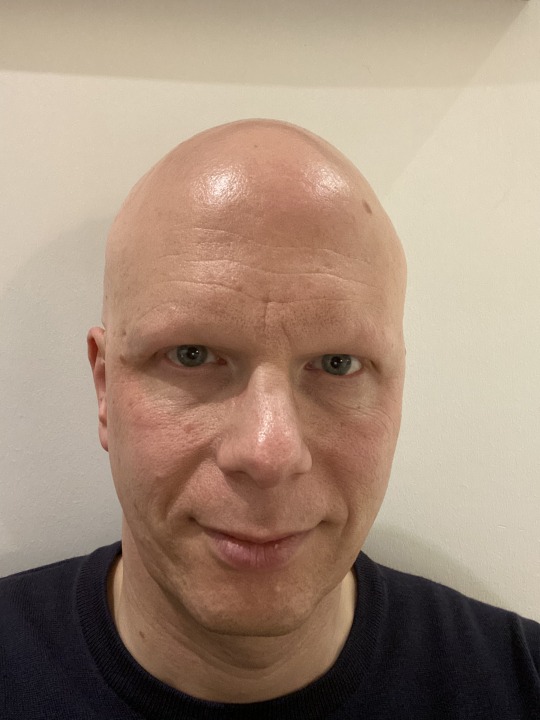
(Me kind of hidden, although more to be protected against sunburn in this case, and revealing all of my full cueball look.)
Sexuality seems to be tied to who we are, at least to a degree. One way this can find its expression would be when, let's say, a man introduces himself in front of a group, and often right after his name, he will add that he is married and has children. Describing himself as a family man can get him bonus points with a lot of people; it can help him to come across as less threatening and is surely seen as an asset in more conservative circles.
When, on the other hand, someone’s sexuality doesn’t correspond to what is seen as the norm, people often feel the need to name precisely that. And I’m not even primarily thinking of those who are "not corresponding", but of others describing them. I’ve often heard one person mentioning someone famous in a neutral or positive way, and another person immediately interjecting „But he/she is gay!“, which literally was meant as some sort of „counterargument“. This occurs a lot less these days.
The same thing also easily happens when those talking about a gay person (to stay with the example) don’t have an issue with their sexuality, but still feel it’s an important characteristic that helps making sense of who that person really is. Maybe that is due to how our sexuality has an influence on the way we relate to others on a basic level.
Finally, people who tend to see themselves as „normal“ seem to feel compelled to state exactly that (one way or another) when others wrongly assume they are part of a sexual minority that was/is considered as „less normal“. And for someone from such a minority, being able to simply mention this aspect of their lives can feel like a huge relief.
Lately, I have thought A LOT about what this means for me as a shy, introvert gay man who’s sexuality is very much linked to different „non-standard practices“ (fetishes), of which hairlessness is one major example. And as I have written on here, I don’t believe I feel drawn to being degraded or humiliated because of my lack of hair. I rather love both the process and result of removing hair, be it on me or on other men.
By being hairless, I express a part of myself that feels both very authentic and vulnerable. Others will generally not know that a big part of my motivation to do this is sexual by nature, and since I’m a guy, many people will also feel free to comment on my appearance in my presence. Mostly not in a mean way, more like feeling the need to tell me I would look better with hair or, on the contrary, that the look really suits me.
Unbeknown to them, they are talking about something which for me is very intimate in nature, and that again is why they can easily step over some boundaries without even realising it. That can make me feel quite exposed, and in case of the more negative comments, insecure. I sometimes use the word „naked“ to describe that state, and some readers who comment on here or chat with me have also used that word in that context.
At the same time, I do actually long for this part of me to be seen by the people I’m close to, with whom I feel comfortable and who don’t have a problem with the concept of „different“. But these are the few people with whom it feels safe to discuss almost anything in connection with sexuality. That in turn rules out most of my family, acquaintances or people I work with. To be completely honest about my motivation to be bald/browless by choice really is that intimate to me. While I try hard not to lie about my motivations, what I will say when asked about it will most likely only amount to some form of „I like it that way“.
So to summarise, I express something very deep about myself by looking the way I do; I don’t want to hide that side of me, but I also don’t want to let everyone into that intimate space by telling me what they really think about it or asking me to justify myself. To complicate things even further, the possibility of being confronted can actually be a thrill, especially after having made some change in my appearance, when I’m not yet sure whether or not people will notice and if I’m going to get away with it. However, it is the possibility that’s the thrill. Being confronted or getting snark comments would actually be a major turn-off.
13 notes
·
View notes
Note
On the issue with James, I do think this is one area where the books aren’t ageless and have to be read in the context of an English school in the 70s written by an author in the 90s. Because by today’s standards, James is less of your garden variety ‘boys will be boys’ type bully and more of an actual sociopath well past the age of criminal responsibility who by 16 had committed one public sexual assault and was an accessory to attempted murder who backed out last second. But I don’t think that’s at all what Jo meant to convey.
Let me guess. Snape fan? :P
Look, my issue with this discourse has always been that only James seems to get so much flack for his most morally ambiguous actions. I mean, Hermione disfigured a girl her age with zits spelling "sneak" because she'd given the DA members out to Umbridge. Harry nearly gored Malfoy to death by using an unknown spell he knew was meant "for enemies". Yet, i've never seen anyone hating on James that would go as hard against these other characters.
On your first point: James wasn't an accessory to attempted murder who backed out last second. Sirius was the one who tricked Snape and nearly got him killed (which would have made Lupin an accessory to murder). James acted to stop it as soon as he realised what Sirius had done. His reasons for doing so remain obscure - Snape thinks he wanted to save his own skin because he would have been blamed alongside Sirius, but that's Snape's interpretation, not exactly the most unbiased source.
Next: i ressent people misusing the term "sexual assault" to describe what James does in Snape's worst memory (a take that, btw, i've only seen upheld as if it were common knowledge by Americans, or very "Americanised" fans). The definition of sexual assault is "unwanted sexual contact", and in the UK especially it pretty much means "rape without penetration". I do think Jo meant for it to be taken seriously (its parallel with the Muggles's treatment by Death Eaters in GoF is clear), only people didn't really at the time. Still. James humiliated Snape, i'd say what he did qualifies as sexual harrassment, and he's rightfully painted as the bad guy in that episode, but he didn't sexually assault Snape.
Also, because we only have that one scene to work with, everyone seems to forget the larger context, namely: Snape created that spell. Judging by the way Death Eaters were still using it 15+ years later, i imagine James wasn't the first nor the last in his generation to use it against another student. I always saw it as a bit analogous to those dangerous/humiliating games that suddenly become trendy with high schoolers until someone gets hurt enough for adults to intervene. I'm comforted in that interpretation by the fact that Snape implies James didn't even know HE was the one to invent the spell, suggesting it started as a thing Snape showed to other Slytherins to gain some social cred, which then spread to the whole school.
Anyways, if that makes James a sociopath, then Hogwarts must have been chock-full of them in the 70s, starting with Snape himself. Maybe the point isn't that Snape or James (or Sirius) are sociopaths, but that imminent war tends to turn people more prone to violence and less likely to abide by moral principles, or consider their designated enemies's humanity. I have no doubt that James morally justified himself and his actions by the fact that Snape belonged to the "bad crowd" of Voldemort's future recruits. Even though we readers know enough about Snape to be able to tell that he was never seriously convinced by Pure Blood superiority.
31 notes
·
View notes
Note
I didn't realize levels of context and such was something I wanted to think/talk on until I read today's page so I decided I might tap you about it if it's alright. Basically, I didn't realize how much I missed everyone Not Being Under Active Pressure until this page. It felt as though something's been made right with the world seeing Erin 0 concealment or hesitation taking notes about Dainix, and what really struck me and got my wheels turning was how this perfectly normal behavior hits so different off the heels of all the weight and pressure and such that Erin and everyone else has been under than it otherwise would hit. Obviously the framing of the page has something to do with the effect I described, but this page feels unique in its requiring context to feel the full scope of the impact.
However, that thought then bounced off a thing that happened where a contextless scene hit me like a truck and demanded I write it despite me having nothing else to apply it to, and I still read it back and need no context to prove to myself that it is a very solid and effective scene in spite of it being like. Five lines and two stage directions. This sort of thing happens with me on occasion where I have isolated moments, single loaded scenes that seem as though they come from context, and yet the context not only doesn't exist but doesn't really need to exist, yet the way it's structured, you think there would surely be grander story context around the scene.
(Sorry I seem to keep giving you walls of contextualizing [ha] before actually getting to the question part) What I wanted to ask you was: What are your thoughts on the relationship between story context and individual scenes/moments in a narrative? The sort of ins and outs of a scene as itself and a scene as part of a story, and a story as a whole and a story as a chain of scenes that give one another context.
This is a fun question, because the need for context to make moments hit was initially something that really frustrated me.
Like many people, my storycrafting started with a big pile of out of context Yo That Would Be So Cool moments - sweet one-liners, fight scenes, big flashy powerups. And I liked the Big Moments from the shows I watched, and wanted to know what made them hit so hard so I could replicate that emotional punch. Was it the kickin' theme music? The determined monologue? The speed lines? The yelling??
And I came to the frustrating conclusion that it was all the slow, often boring setup that had come before the big moment.
The sudden reveal of a superpowered evil side means nothing if we don't know what that character is supposed to act like. A character drawing motivation from a dead loved one tells us nothing if we don't ourselves know and love the person they lost. A jaded, powerful warrior will seem generic if we don't know the fun-loving child they spent two whole seasons being. A character backed into a desperate corner will reveal untapped wells of heroism we can't appreciate if we don't realize how rare this is for them. Powerful moments are in some way carried by what happens in them, but in a much larger way are carried by the contrast between them and the story that preceded them. Stripped of context, all the moments I loved - all the TVTropes "Crowning Moments of Awesome" - were either mindlessly flashy or oddly underwhelming.
In order to make the moment hit, even if the moment was so much more fun and interesting than anything else, the writer had to write all the buildup and pace it out enough that it stuck with the audience, and the audience had to experience that buildup. It just wasn't possible to write a story that was one amazing thing after another without the amazing things losing more and more impact.
We're all on tumblr here, so I'm sure we've all experienced That One Person We Follow getting into some new media property we don't know about. They post mini-essays about why That One Bit With Character A And Character B Was So Powerful, gifsets of two people standing in a dark room captioned with "they were in love here 😍" and extremely well-made fanart of people you don't recognize in vaguely saint-like poses, sometimes captioned with something you think cannot possibly be relevant. This is fine, because you're not the target audience for that fan content. That's for people who already know what the fanart is about - it's essentially referential art that doesn't stand on its own to an outside audience.
But I want people to watch and enjoy the things I watch and enjoy so I have people to talk about those things with. And that means I have spent long hours trying to figure out how to explain to a skeptical audience why a story I liked was so good, and what made the awesome moments work. This is a huge part of the impetus behind Trope Talks, and why the in-depth examples I use always have context as a preamble. Without the context, the moment doesn't work.
If you think a gutpunch is just the moment the fist connects, you're disregarding the windup that actually makes it hit.
198 notes
·
View notes